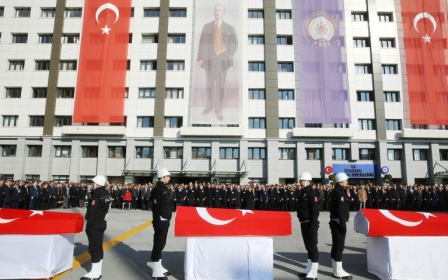Istanbul nightclub Santa attack kills 39, wounds 70

Thirty-nine people were killed and 70 wounded in a "terror" attack in Istanbul early Sunday when a gunman reportedly dressed as Santa stormed an elite nightclub where partygoers were celebrating the New Year, the latest carnage to rock Turkey after a bloody 2016.
One gunman entered the venue dressed as Santa and began spraying bullets at random inside the Reina nightclub, one of the city's most exclusive party spots, Dogan news agency said.
"Unfortunately, at least 35 of our citizens lost their lives. One was a police officer. Forty people are receiving treatment in hospitals," Vasip Sahin told reporters at the scene of the nightclub on the Bosphorus in the city's European side.
"What happened today is a terror attack," he added.
"A terrorist with a long-range weapon ... brutally and savagely carried out this incident by firing bullets on innocent people who were there solely to celebrate the New Year and have fun," Sahin told reporters at the scene.
Many party-goers threw themselves into the Bosphorus in panic after the attack and efforts were underway to rescue them from the waters, NTV television said.
Dogan news agency reported that some witnesses claimed the attacker was "speaking Arabic," while NTV broadcaster said special force police officers were still searching the nightclub.
TV images showed the scene cordoned off by police officers. According to Dogan, there were at least 700 revellers celebrating the start of 2017 at the club.
Television pictures showed the New Year partygoers - including men in suits and women in cocktail dresses - emerging from the nightclub in a state of shock.
The nightclub in the Ortakoy district of Istanbul is one of the most elite spots in the city, and getting inside past the bouncers who seek out only the best dressed is notoriously hard.
Turkey has been hit by a string of attacks in recent months blamed on Kurdish and Islamic State (IS) militants.
On 10 December, 44 people were killed in a double bombing in Istanbul after a football match hosted by the top side Besiktas.
That attack, which targeted a police bus, was claimed by the Kurdistan Freedom Falcons (TAK), seen as a radical offshoot of the Kurdistan Workers' Party (PKK).
A week later, 14 Turkish soldiers were killed and dozens more wounded in a suicide car bombing blamed on Kurdish militants targeting off-duty conscripts also claimed by the TAK.
The recent spike in violence has capped a bloody 2016 in Turkey which saw more attacks than any other in the history of the country.
In June, 47 people were killed in a triple suicide bombing and gun attack at Istanbul's Ataturk airport, with authorities blaming IS.
Another 57 people, 34 of them children, were killed in August in a suicide attack by an IS-linked bomber at a Kurdish wedding in the southeastern city of Gaziantep.
Turkey is still reeling from a failed 15 July coup blamed by the government on the US-based Islamic preacher Fethullah Gulen that has been followed by a relentless purge of his alleged supporters from state institutions.
The attack also comes as the Turkish army is waging a four-month incursion in Syria to oust IS and Kurdish militants from the border area.
The Turkish army and its Syrian rebel allies have been taking increasing casualties at al-Bab in the bloodiest confrontation of the incursion so far.
Amid fears of another attack in Istanbul, at least 17,000 police officers were deployed in the city for this year's New Year's Eve celebrations.
Stay informed with MEE's newsletters
Sign up to get the latest alerts, insights and analysis, starting with Turkey Unpacked
Middle East Eye delivers independent and unrivalled coverage and analysis of the Middle East, North Africa and beyond. To learn more about republishing this content and the associated fees, please fill out this form. More about MEE can be found here.




